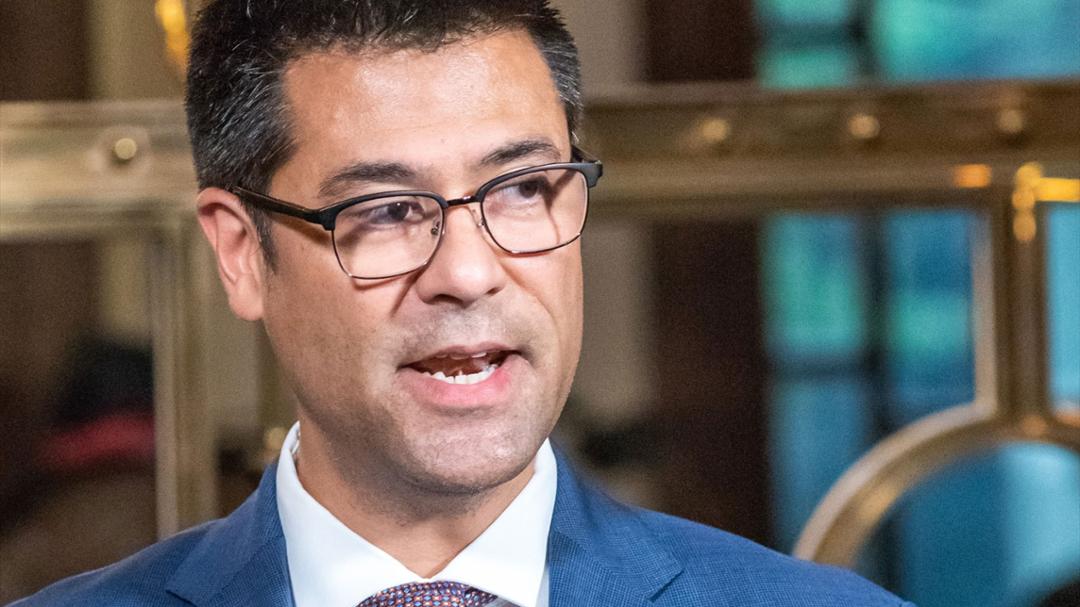Michael Turner’s path wasn’t a straight line, but with the inspiration of a few good professors and a study abroad opportunity, his mission became clear.
Michael Turner enrolled at Texas Tech University as a journalism major. A few semesters later, he transferred to theatre arts. He then found a love for travel through study abroad and tied his interests together with history.
Today, he is the counselor for cultural affairs at the U.S. Embassy in France.
“I realized the whole world was a stage,” Michael said. “It wasn’t just theater I was interested in, but rather, theater was the vessel that showed me how big this world is.
Michael will be at the center of that big world during the 2024 Summer Olympics in Paris. He and his team will be launching a public diplomacy campaign called Games4All that will be woven into the Olympic and Paralympic games.
Finding His Way
It’s no surprise Michael’s career has taken him around the world. His father served in the U.S. Air Force, causing their family to move often. They moved to Iran when Michael was just two years old. From there they went to California, Panama and Thailand.
As Michael puts it, he never really had a home base. Approaching college, he wanted to feel more stationary. His family was living in the U.S. during his senior year, and a friend of Michael’s was headed to Texas Tech. This sounded like a good idea, so Michael tagged along.
“I’d always been interested in writing and theater,” Michael said. “I started as a journalism major but quickly realized I wanted to do fiction writing.”
He leaned into that, building worlds readers could get lost in. He’d taken theater in high school and fallen in love with it. Michael likened it to playing make believe in a structured environment. Theater provided scope for the imagination while also having rules.
So, Michael became a theater major and earned a Bachelor of Fine Arts. The program allowed him to write, act and even work on production, all things he found fascinating.
“I was better at certain parts than others,” he laughed. “It became apparent to me rather quickly there was no Oscar for best actor in my future.”
But Michael showed a predilection for studying and analyzing plays, extracting meaning from them. This fueled his interest in writing plays of his own and studying the great playwrights.
About halfway through college, Michael investigated studying abroad.
He discovered an exchange program Texas Tech established with Loughborough University in England. Michael quickly leaped at the chance to study Shakespeare in the bard’s homeland.
The time abroad brought something familiar out in Michael.
“I thought my traveling days were over,” Michael said. “But I guess I had a travel bug and it got reignited.”
On breaks from classes, Michael would travel to Spain, Austria, France, Germany and Morocco. Each location was a new discovery, revealing as much within Michael as it did around him. Whether that was more confidence or a new interest, he came alive during that time.
Michael returned to Lubbock to finish his last year of school, and it’s a good thing he did because there was a final piece of the puzzle that needed to come together.
Michael enrolled in one of Otto Nelson’s history courses. He’d been fairly disinterested in history up until that point but says Nelson’s class brought history to life. Michael started making connections between the plays he loved and the times and places they took place.
“Art represents the time it was created,” he said. “It’s influenced by the environment it existed in.”
When this synced in his mind, Michael was hooked. No longer was history a list of dates in a textbook, but a collection of stories throughout time.
“Turns out I did like history,” he laughed. “It was the reason I loved studying plays. History created these works of art. It sprung up from that moment – nothing is created in a vacuum.”
From that point on, Michael allowed his interests to work together. They were like the stage characters he loved so much – different but interwoven.
That was the greatest lesson college taught Michael.
“Texas Tech showed me how big the world was, and that I didn’t have to be just one thing,” he said.
After graduating from Texas Tech in 1993, Michael moved back to England for a year. Needing a longer visa, he returned to the U.S. and sought a secondary degree that would allow him to live abroad. Michael attended New York University and received a master’s degree in Teaching English to Speakers of Other Languages (TESOL).
With two degrees in hand, he took a job with the Japan Exchange and Teaching Program (JET) and moved to northern Japan.
“In my time teaching I made an important discovery: I really sucked at teaching,” he laughed.
Michael didn’t see this as a failure, just as a clue to a better fit. Michael’s father had been an educator and told his son that teaching was a calling. He likened it to a priesthood, and Michael realized he might not be part of that sacred mission.
Yet, Michael was happy living abroad and wasn’t interested in moving back to the U.S.
In 1995, he took a trip to clear his head and see new sights. He had some time off, but Japan was an expensive country to travel, so he opted for Vietnam. Not only was it more affordable, but Michael had a personal incentive for visiting.
“My father served in the Vietnam War and was wounded by an explosion,” he said.
Michael told his father he wanted to see where he’d served, but like many veterans in the 1980s and 1990s, his father had complex feelings about the war. Many veterans had close ties to Vietnam, while some wanted to forget.
Michael packed a bag and traveled by himself through Vietnam for two weeks.
“I remember sitting outside at a French-style café in Ho Chi Minh City and sensing an energy and excitement around me,” he recalled. “I was in a place where I knew no one and couldn’t speak the language. It was life-changing.”
A situation that would cause many people panic only created a sense of awe in Michael.
As he drank his coffee and observed all the intricacies of the fascinating city he found himself in, he marveled at how history, time and culture shaped everything he saw.
“There had been real conflict in that place, and I wasn’t sure if we as Americans always considered how our presence had defined that young nation. We saw the impact on our own lives, but I wondered if we saw the impact on the lives of those in Vietnam.”
At 25 years old, Michael felt he’d stumbled upon something. His interest in art, culture, travel and history were all coalescing in genuine curiosity about other cultures and the relationships those people had with the U.S.
He decided to take the foreign service exam.
Now you can take the test online, but back in the 90s applicants had to go to an embassy for a whole day. The written exam was followed by an oral exam and then a security clearance check.
Michael passed each section and joined the U.S. State Department in 1998; he’s never looked back.
A Common Cause
One of Michael’s favorite parts of working for the U.S. State Department is how diverse and dynamic it is.
“My incoming class had 56 people in it; only four people were on their first career,” Michael said. “We had prior salesmen, lawyers and military members.
“The only thing we had in common was our nationality.”
While skills and expertise are important, the department primarily looks for recruits who exhibit integrity, honesty, resiliency and flexibility. These are all strengths Michael possesses, which has made him a strong fit for more than two decades.
Michael’s career has taken him to the countries of Georgia, Thailand, Myanmar and Japan, to Washington D.C. and now France. And it hasn’t just been Michael. His wife and three children have been along for the ride through each assignment.
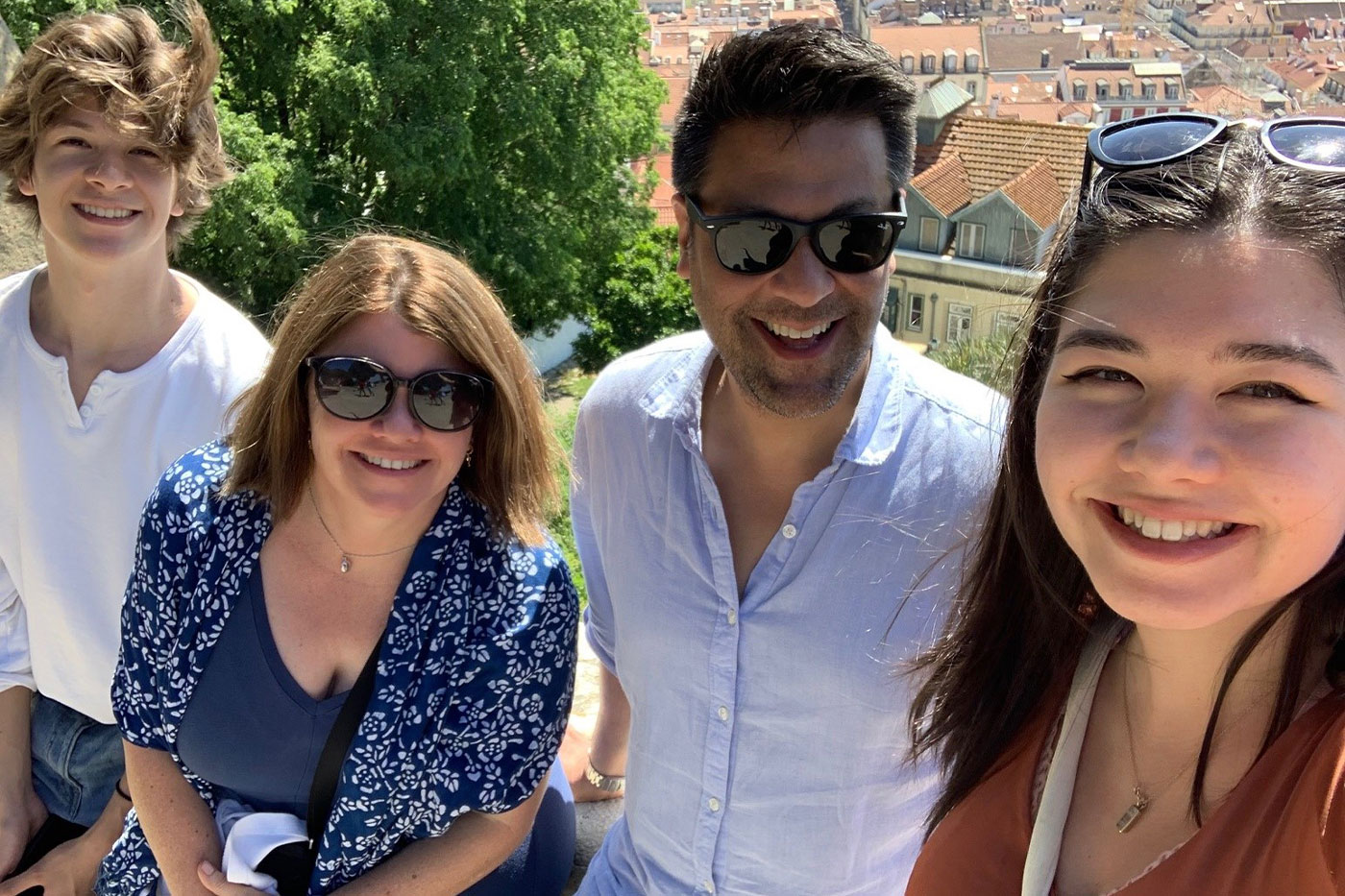
Michael met his wife when he was teaching in northern Japan. The two fell in love and got married and now have three grown children. The bonds connecting the five of them are important, as they’ve been each other’s constant through many relocations.
The U.S. State Department reassigns foreign service members every three years. While preference is taken into consideration, employees have only so much control over the process.
“I liken it to the sorting hat in Harry Potter,” Michael joked. “They take your rank, expertise, and preferred country into consideration, but you never quite know what your assignment will be.”
If someone is sent to a more dangerous location, assignments are shorter. But for most places, it’s a three-year commitment.
While Michael could tell stories upon stories about the places he’s lived and the people he’s met, his focus is on France. And it’s evident from the excitement you feel when you talk to him.
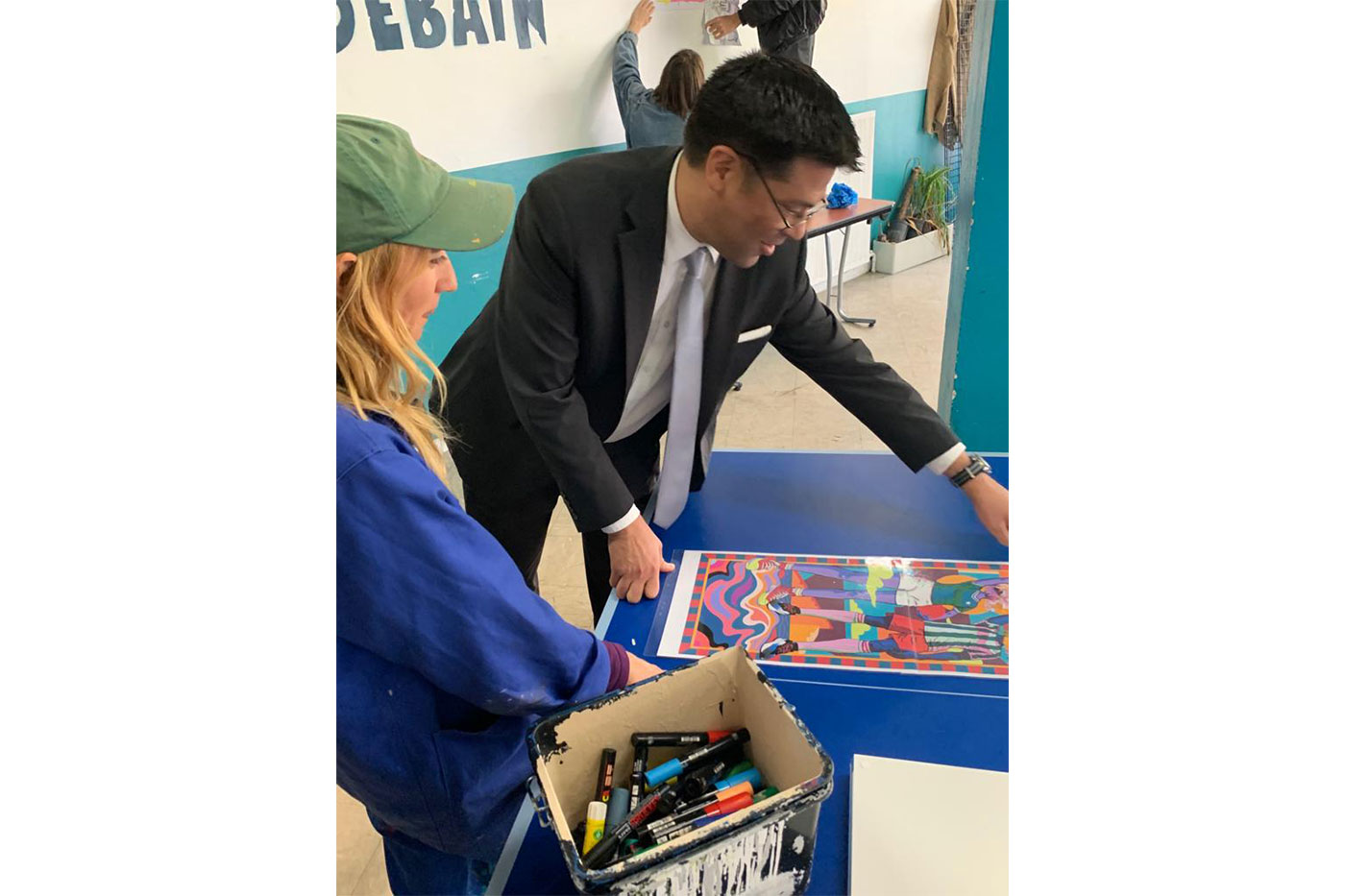
France and the U.S. are bonded.
“One of the things I’ve come to respect while here is how much the U.S. owes France,” Michael said. “They supported us in our struggle for independence. They gave us money, political support, but most of all, soldiers. French people died fighting for our freedom during the Revolutionary War.
“In many ways, we returned that when U.S. soldiers landed on the beaches of Normandy to liberate France from the clutches of Nazi Germany.”
Michael admits, there are always political reasons for countries to do what they do, but it doesn’t take away from the real investment made, especially by individuals.
In all the places Michael has worked, but especially now stationed in Paris, his focus is on strengthening relationships. Because at the end of the day, even world allies start with a simple thing – friendship.
“I’m not out there settling legislation,” Michael said. “My job is to invite people to those conversations.”
Michael is an expert conversationalist, relationship builder and people connector.
“I’m a storyteller for the United States,” he said. “That’s how I see my job.”
He is never going to tell someone what to think about the U.S. But he will give them opportunities to form their own opinion. He does this in many ways. He’s been part of leading exchange programs to and from the U.S. This allows high school and college students to have their own American experience.
Michael admits occasionally, someone is unhappy with that experience. But often, it’s a very positive thing. When those students go home, they’ve built friendships with Americans.
“Who knows how those relationships will grow,” Michael said.
Another way he helps make connections is by bringing Americans to France. Recently he brought in leaders from the U.S. to speak with the mayors of French coastal cities as any communities worldwide are facing rising sea levels.
“We brought in the mayor of Sausalito, California, who is an environmentalist,” Michael said. “She talked to the French mayors and shared ideas and also hopefully corrected the impression that Americans are indifferent to environmental change.”
The visit was mutually beneficial. While the French built a positive relationship with an American environmentalist, Americans also learned from the French, who are environmentally minded.
Remembering D-Day
This summer has, and will, be a highlight of Michael’s career. Before the Olympics got underway, early June marked a banner moment.
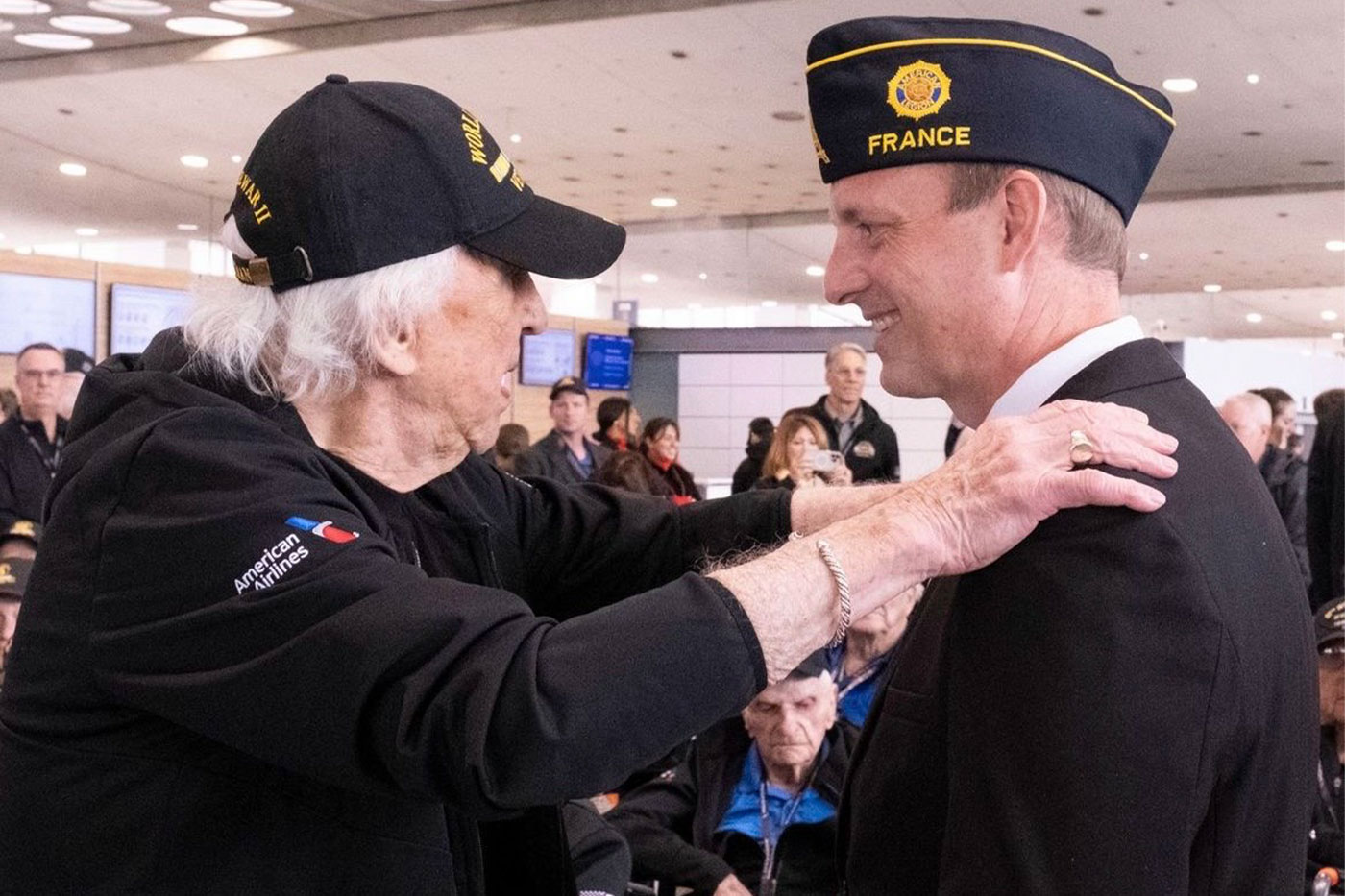
June 6 was the 80th anniversary of D-Day, when U.S. soldiers advanced across the beaches of Normandy in 1944. It was the first step of many that would eventually end WWII. As part of the celebration, Michael’s office assisted the White House in a week-long celebration in France. There were exhibitions, dinners and ceremonies filled with joyous Americans and French citizens.
While many eyes were upon President Joe Biden and President Emmanuel Macron, Michael had the opportunity to meet with other special guests.
A flight of 66 U.S. veterans landed in Paris on June 1. Michael and his team were there to receive them. The youngest veteran was 98; the oldest 107.
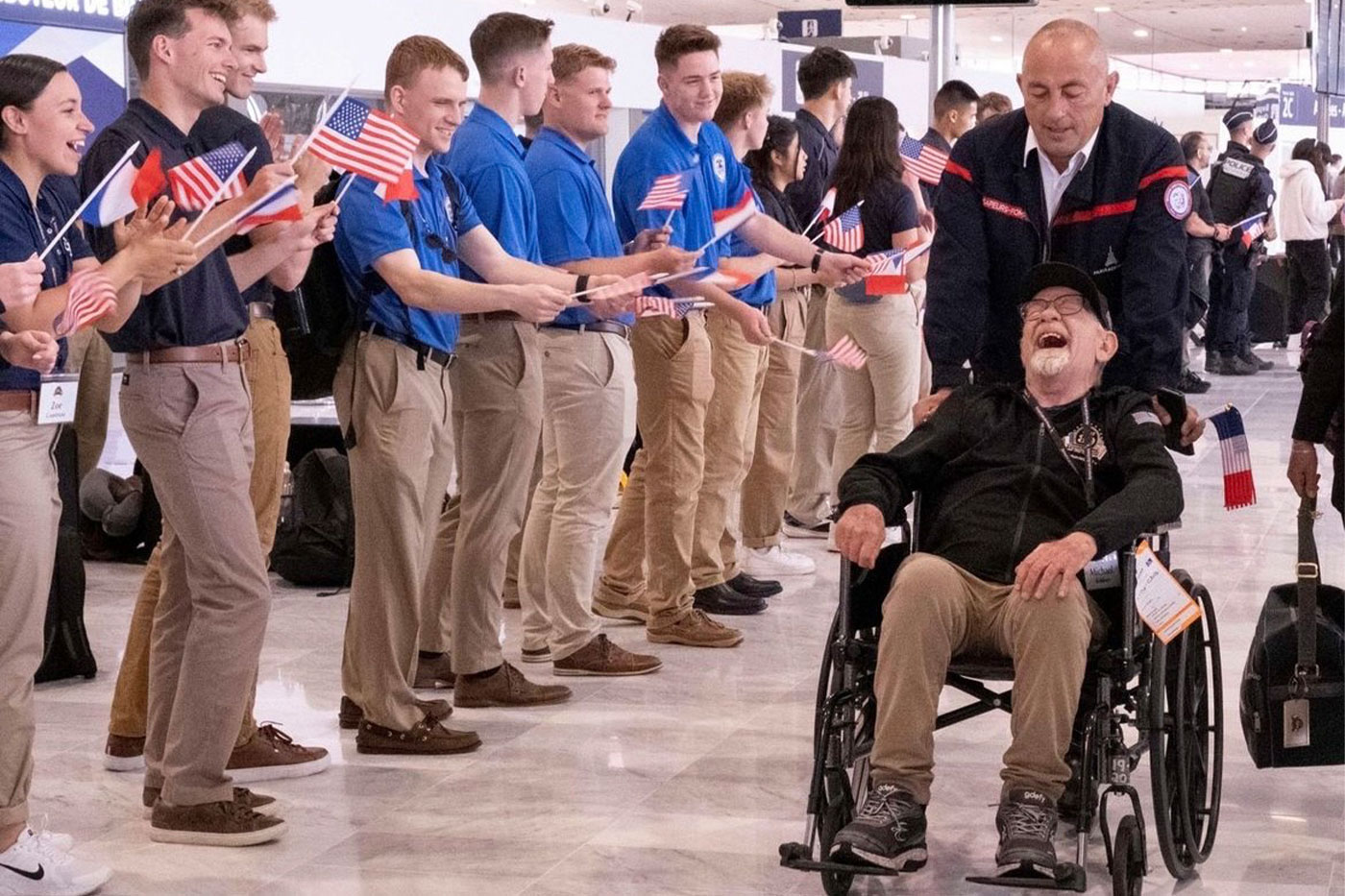
There was a brief ceremony held at the airport for the heroes, heavily attended by French citizens waving flags. Both the French and the American national anthems were played.
When America’s national anthem started, each of the wheelchair-bound veterans stood up.
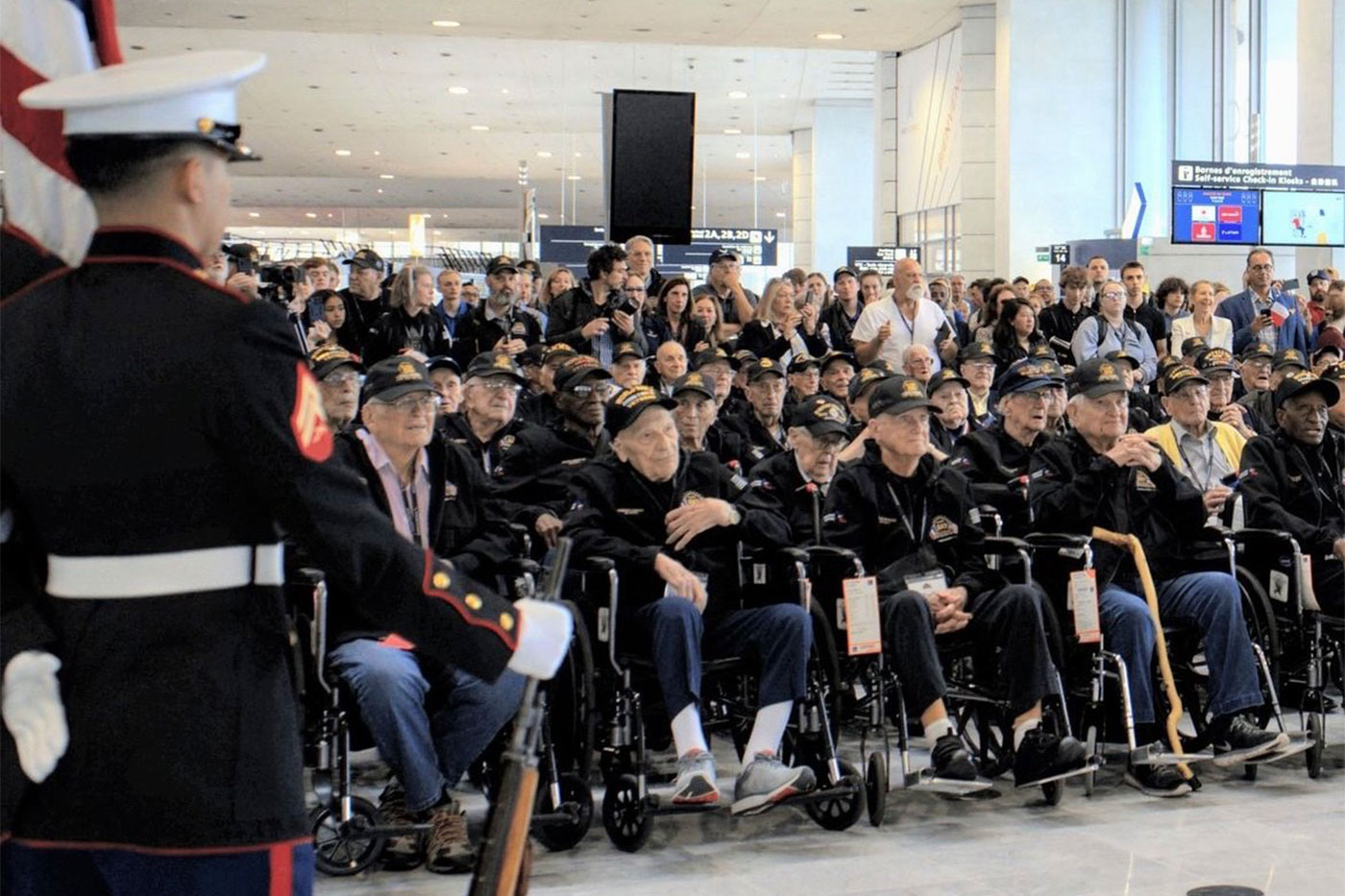
“I was looking out at these heroes who made the journey for what is likely their last time, to France,” Michael said, getting emotional thinking about their first visit to France. “It was one of the most moving moments of my career.”
The Olympics
With D-Day festivities behind them, Michael’s team is moving full speed ahead to prepare for the Summer Olympics which begin July 26.
Sports diplomacy has long been a resource used by the U.S.
“The star power of our athletes is a great way to get young people thinking of the U.S. as a place to study or a place to do business with later in their careers,” Michael said.
Games4All is a public diplomacy campaign that celebrates a shared love of sports; pastimes every nationality can rally around. The U.S. will engage in conversations around athletes with disabilities, athletes with different cultural backgrounds and gender equality, which this summer is a testament to as it’s the first Olympic Games with complete gender parity. An equal number of men and women will compete on the fields of play.
“But it’s not just about athletes on the field either,” Michael said.
The U.S. State Department has created a Fulbright sports scholarship to share insights into innovation and technology. Michael’s team also funded a delegation of coaches and teachers going to the U.S. to learn how sports can help youth with mental health struggles.
If there is a worldwide issue, it’s likely sports can reach it and its audience in some way. It’s a way to bring people to the table – or the field.
“The campaign will run all the way through the games in Los Angeles in 2028,” Michael said. “We hope to host many conferences and exchange programs during that time, deepening international relationships.”
At the end of 2025, Michael’s assignment will change. He doesn’t know what’s next, but his mission will not change.
“There are some people willing to give up on the world these days,” he said. “They think it’s too screwed up and nothing will change.
“My generation did screw some things up, so I understand why young people feel that way. Yet, there are so many examples of progress and goodness, and we just don’t see them. I’ve seen a lot of the world and I’ve seen a lot of good. I see it this way: we’re living in the best moment in human history. We’re better off now than ever before. There is more literacy, more human rights and more health advances.
“We do have a responsibility to make something of that, though, and that can’t be accomplished by any one person. It will take all of us.”

